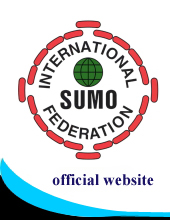From ISF website.
This is my fourth post on different Japanese Budo group's perspectives on the internationalization (globalization) efforts of their respective Budo arts. These come from the official 25th International Seminar of Budo Culture report, which was held in March.
This is not an exact or perfect summary, but it should be enlightening in regards to what Budo leaders in Japan are thinking. Any mistakes are my own.
Sumo
Speaker: Councilor - East Japan Student Sumo federation, Mr. Ryo Ito
The International Sumo Federation (ISF) began in 1992 with the inaugural men's world championships. The junior men's worlds was first held in 1999, the women's worlds first in 2001, and the junior women's worlds first in 2008.
Now there are 87 countries affiliated with ISF and it has received IOC recognition to be part of the non-Olympic sports in the World Games.
International events have light, middle, heavy and open weight categories, plus the competitors can weight spats under their mawashi.
The challenges for sumo are a lack of instructors overseas and a lack of proper sumo stable training spaces (dohyo).
Review
As this presentation is trying to seem egalitarian which is great, it would be interesting to know what connections the amateur international sumo movement has to the professional Japan domestic sumo industry. If major league baseball in the US is the top professional league which players from around the world are trying to get into, is there the same phenomenon with top ISF participating athletes trying to 'go pro' in Japan? If so, what are the challenges for the athletes and the Japanese dohyo that accepts them, and does the ISF have a role to play in the transition?
Of course the main question is do people overseas right now get interested in sumo simply when an instructor offers practices, or are there other reasons as well.
I attended the Vancouver Sumo Basho in June 7-8, 1998 when the top wrestlers came over for 2 days to put on a mini-tournament. It was quite well hosted, the athletes seemed to be in top form and the arena was completely sold out. If proper transparency and sport pedagogy practices finally emerge in the operations of sumo then the professional sport may have a wider appeal overseas, to which the ISF affiliated clubs could feed into.

